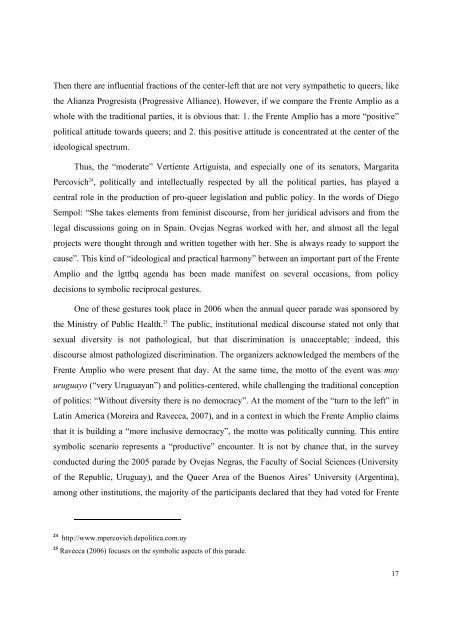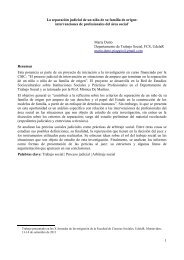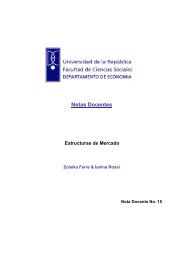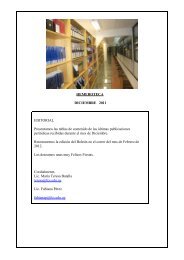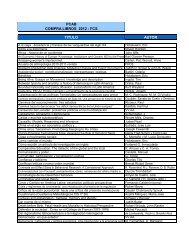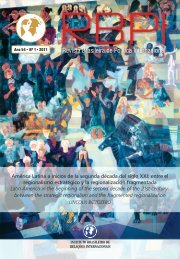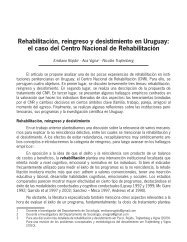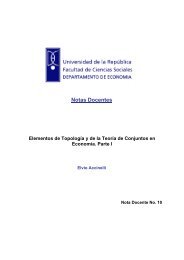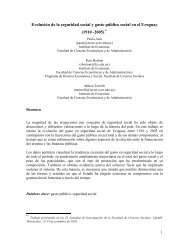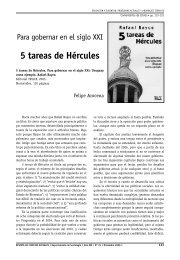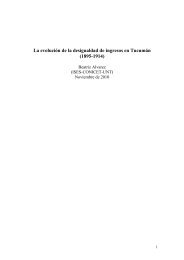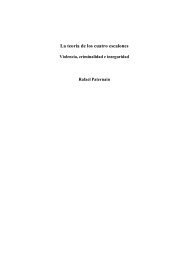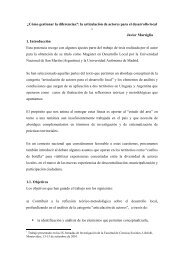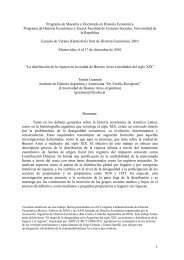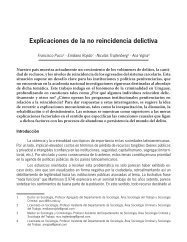Paulo Ravecca - Facultad de Ciencias Sociales
Paulo Ravecca - Facultad de Ciencias Sociales
Paulo Ravecca - Facultad de Ciencias Sociales
You also want an ePaper? Increase the reach of your titles
YUMPU automatically turns print PDFs into web optimized ePapers that Google loves.
Then there are influential fractions of the center-left that are not very sympathetic to queers, like<br />
the Alianza Progresista (Progressive Alliance). However, if we compare the Frente Amplio as a<br />
whole with the traditional parties, it is obvious that: 1. the Frente Amplio has a more “positive”<br />
political attitu<strong>de</strong> towards queers; and 2. this positive attitu<strong>de</strong> is concentrated at the center of the<br />
i<strong>de</strong>ological spectrum.<br />
Thus, the “mo<strong>de</strong>rate” Vertiente Artiguista, and especially one of its senators, Margarita<br />
Percovich24 , politically and intellectually respected by all the political parties, has played a<br />
central role in the production of pro-queer legislation and public policy. In the words of Diego<br />
Sempol: “She takes elements from feminist discourse, from her juridical advisors and from the<br />
legal discussions going on in Spain. Ovejas Negras worked with her, and almost all the legal<br />
projects were thought through and written together with her. She is always ready to support the<br />
cause”. This kind of “i<strong>de</strong>ological and practical harmony” between an important part of the Frente<br />
Amplio and the lgttbq agenda has been ma<strong>de</strong> manifest on several occasions, from policy<br />
<strong>de</strong>cisions to symbolic reciprocal gestures.<br />
One of these gestures took place in 2006 when the annual queer para<strong>de</strong> was sponsored by<br />
the Ministry of Public Health. 25 The public, institutional medical discourse stated not only that<br />
sexual diversity is not pathological, but that discrimination is unacceptable; in<strong>de</strong>ed, this<br />
discourse almost pathologized discrimination. The organizers acknowledged the members of the<br />
Frente Amplio who were present that day. At the same time, the motto of the event was muy<br />
uruguayo (“very Uruguayan”) and politics-centered, while challenging the traditional conception<br />
of politics: “Without diversity there is no <strong>de</strong>mocracy”. At the moment of the “turn to the left” in<br />
Latin America (Moreira and <strong>Ravecca</strong>, 2007), and in a context in which the Frente Amplio claims<br />
that it is building a “more inclusive <strong>de</strong>mocracy”, the motto was politically cunning. This entire<br />
symbolic scenario represents a “productive” encounter. It is not by chance that, in the survey<br />
conducted during the 2005 para<strong>de</strong> by Ovejas Negras, the Faculty of Social Sciences (University<br />
of the Republic, Uruguay), and the Queer Area of the Buenos Aires’ University (Argentina),<br />
among other institutions, the majority of the participants <strong>de</strong>clared that they had voted for Frente<br />
24 http://www.mpercovich.<strong>de</strong>politica.com.uy<br />
25 <strong>Ravecca</strong> (2006) focuses on the symbolic aspects of this para<strong>de</strong>.<br />
17


